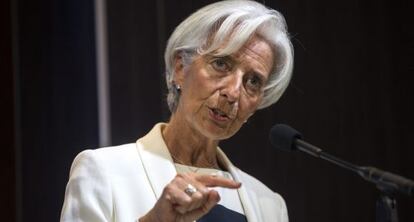IMF warns Spain that economic growth may slow over next five years
After hitting 3.1% this year, GDP rise will decline to 1.8% by 2020, organization predicts Fund calls for more labor market reforms and budget cuts while protecting the “vulnerable”

The International Monetary Fund warned on Friday that Spain's accelerating economic growth is likely to slow in the next few years after picking up to 3.1% by the end of 2015.
In its latest report, the IMF said Spain would close out 2016 with 2.5% growth – a figure still above the European average – followed by a continued decline over the next five years, contracting to 1.8% in 2020. In April, the IMF said the Spanish economy would close the year with 2.5% growth and 2% in 2016.
Deep structural problems limit Spain’s growth potential going forward”
Although the IMF commended the “strong policy implementation” of Spain’s conservative Popular Party government, which has “supported the return of confidence” and helped create jobs, it also noted that “more than five million people remain unemployed and new jobs still rely heavily on temporary and part-time contracts.”
IMF directors said Spain needs to improve conditions to allow small- and medium-sized enterprises to grow, and recommended keeping wages in line with productivity and business conditions at the firm level and strengthening the skills of the long-term unemployed.
The report was drawn up based on the conclusion of the organization’s last annual meeting with Spanish officials to discuss economic development and policies and to collect data for the executive board.
After seven years of crisis, Spain’s economy is now growing faster than the European average thanks to unprecedented monetary stimulus packages and drops in global oil prices. Even the construction industry – one of the sectors worst hit by the downfall – is experiencing a small comeback and once again contributing to GDP growth.
Spain needs to improve conditions for small- and medium-sized enterprises, says the IMF
But the IMF warns that “deep structural problems limit Spain’s growth potential going forward and vulnerabilities remain.”
The IMF executive board’s biggest concerns are the country’s high unemployment rate, which is expected to close at 22% at the end of this year and 20.1% in 2016, and its private and public debt.
The Fund’s directors emphasized that Spain must do its best to place the public debt-to-GDP ratio on a firm downward path “by pursuing gradual growth-friendly fiscal consolidation and saving any windfall from higher nominal growth and lower borrowing costs.”
While calling for “ambitious and well-specified budget measures,” the IMF stressed that the government must also protect “the most vulnerable.”
“Improvements to the regional fiscal framework and close coordination across all levels of the government are also critical to these consolidation efforts,” said the report.
“Spain has a large negative net international investment position, which adds to its external vulnerabilities. In this context, a key risk is a reversal of reforms already carried out, which would create uncertainty and could hamper the recovery, especially if the external environment were to deteriorate sharply,” the report stated.
Tu suscripción se está usando en otro dispositivo
¿Quieres añadir otro usuario a tu suscripción?
Si continúas leyendo en este dispositivo, no se podrá leer en el otro.
FlechaTu suscripción se está usando en otro dispositivo y solo puedes acceder a EL PAÍS desde un dispositivo a la vez.
Si quieres compartir tu cuenta, cambia tu suscripción a la modalidad Premium, así podrás añadir otro usuario. Cada uno accederá con su propia cuenta de email, lo que os permitirá personalizar vuestra experiencia en EL PAÍS.
En el caso de no saber quién está usando tu cuenta, te recomendamos cambiar tu contraseña aquí.
Si decides continuar compartiendo tu cuenta, este mensaje se mostrará en tu dispositivo y en el de la otra persona que está usando tu cuenta de forma indefinida, afectando a tu experiencia de lectura. Puedes consultar aquí los términos y condiciones de la suscripción digital.








































